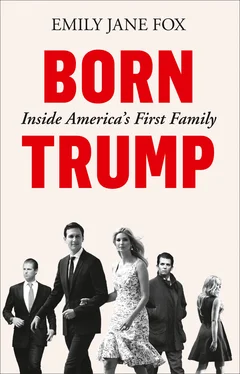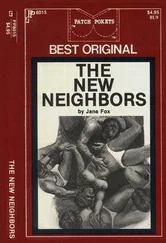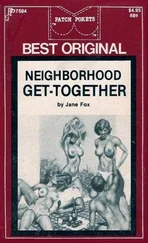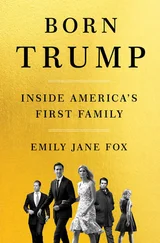“Mr. Kushner, I ask you,” she wrote, “what are you going to do about this?”
Jared wrote his own op-ed in response, under the headline “The Donald Trump I Know.” He defended his father-in-law as “tolerant” and said that “the from-the-heart reactions of this man are instinctively pro-Jewish and pro-Israel.” He invoked the story of his grandparents, who survived the Holocaust, as proof that he knew “the difference between actual, dangerous intolerance versus these labels that get tossed around in an effort to score political points.”
Some of Jared’s own cousins, reigniting a more-than-decade-old family feud that had been punctuated by Jared’s father getting sent to federal prison, took issue with this defense. “I have a different takeaway from my Grandparents’ experience in the war,” Marc Kushner wrote in a Facebook post shortly after, linking to the op-ed. “It is our responsibility as the next generation to speak up against hate. Antisemitism or otherwise.” Another first cousin, Jacob Schulder, was harsher. In a comment on Marc’s post, he wrote: “That my grandparents have been dragged into this is a shame. Thank you Jared for using something sacred and special to the descendants of Joe and Rae Kushner to validate the sloppy manner in which you’ve handled this campaign … Kudos to you for having gone this far; no one expected this. But for the sake of the family name, which may have no meaning to you but still has meaning to others, please don’t invoke our grandparents in vain just so you can sleep better at night. It is self serving and disgusting.”
Jared’s parents, Charlie and Seryl, were supportive of the Trump campaign, hosting a couple of open houses at their Long Branch, New Jersey, beach house on Donald’s behalf throughout the campaign. It wasn’t an option not to throw their support behind Donald; in effect, that would mean not throwing their support behind Jared. They were proud of what he was doing, and whatever he needed, they would do. That their son was effectively running a presidential campaign gave them enough naches for them to put their own distaste at some of the campaign nonsense and rhetoric aside.
The Access Hollywood tape, for instance, rippled their household. But what rankled them wasn’t Donald’s language—that he’d boasted about using his special privilege as a celebrity to grab women by the genitals, or kissing a married woman he wooed with furniture shopping. It was that their son had walked to Trump Tower the day after the story broke to help handle the fallout. It was a Saturday, and their son shouldn’t have been working. That, they told him, wasn’t quite keeping Shabbat.
WHAT DIVIDED the community most unfolded over the summer of 2016. As the campaign worked with the Republican National Committee to put together the schedule for its convention in Cleveland, the Trump-Kushners threw out an idea. Why not ask Rabbi Haskel Lookstein, who’d shepherded Ivanka through her conversion process years earlier and led the congregation the Trump-Kushners attended in New York, to deliver an invocation, an opening prayer to kick off the convention? Lookstein had commanded the pulpit at the Congregation Kehilath Jeshurun, or KJ, for decades, taking over the gig from his father. Israel’s Bar-Ilan University had granted him an honorary doctorate in recognition for the “influential role he has played in deepening Jewish values and heritage among American Jewry.”
The rabbi agreed, a personal decision that he said he made to honor her request, out of respect for her and their relationship. In the lead-up to the convention, he settled on an invocation that prayed for the welfare of the government, thanking God for translating into reality the biblical command to “proclaim liberty throughout the land for all the inhabitants thereof” and for the constitutional government that fostered “the American ideals of democracy, freedom, justice and equality for all, regardless of race, religion or national origin.” He would ask God to help us form a government that would “protect us with sound strategy and strength; which will unite use with words of wisdom and acts of compassion.”
By all measures, it was a prayer most Americans, particularly those concerned by some of the campaign rhetoric and policies taking shape and gang-who-couldn’t-shoot-straight-ness of it all, would have been heartened to hear. On a subtler level, it seemed almost like a troll of the candidate’s position on immigration and concerns over his tolerance for people who looked and lived differently than he did.
Of course, that is not why the Trump-Kushners asked their rabbi to participate. “Jared and Ivanka felt like this was simple, a way to honor their rabbi with whom they had a close relationship,” a member of the congregation recalled. But the simple things often turned complicated, in an instant, for everyone attached to the campaign, Javanka included.
The Trump campaign hastily sent a list of speakers, including all four adult Trump children, vice presidential nominee Mike Pence, former NFL quarterback Tim Tebow, former underwear model Antonio Sabàto Jr., and Lookstein. No one told the rabbi that his name would be included on a publicized list, which means he had no time to inform the campaign officials that he was not, in fact, giving a speech at the convention. He was simply offering a prayer.
The distinction may have made a difference to his congregants. Or maybe it wouldn’t have, given the immediate backlash he faced once the announcement went public. Congregants started an online petition, signed by nearly 850 people, condemning the rabbi for lending his blessing to Donald Trump.
Lookstein reconsidered. In a letter emailed to his congregants and friends, he wrote that “the whole matter turned from rabbinic to political, something which was never intended.” Politics, he added, divide people, and he had spent his life uniting. “In the interest of bringing our community together, I have asked to be relieved of my commitment to deliver the invocation.” Some guilt did wash over Ivanka and Jared for the trouble they had caused the rabbi and for the controversy kicked up in their community. At the same time, they felt like they were getting hung out to dry and didn’t see this as their fault in the slightest. “An amateur level of organization created a problem that did not need to exist,” one person who was part of the planning said. But friends and members of their congregation whispered that they should have known better. “Part of this was that when you’ve become a bigger fucking deal,” one congregant mused, “everything you do becomes a bigger fucking deal, and for some reason they didn’t catch on to that.”
SOME PEOPLE in the Trump-Kushners’ community—KJ members, Ramaz parents, people who went to the Modern Orthodox yeshiva school that Jared attended in Paramus, New Jersey—thought it was a big fucking deal to have one of their own become a big fucking deal. On Saturday mornings throughout the campaign, as the rabbis spoke or cantors chanted, congregants would whisper that it was somewhat of a comfort to have him in the candidate’s ear. He was a guy they davened with, who grew up the way they did, with the same kinds of values and priorities they were all taught in school and at home and in temple on Shabbat. “It is still someone who we grew up with, who’s close to someone who may be the president,” one acquaintance from high school explained at the time. “That is never bad.”
Many agreed, however, that if they had their druthers, and it was up to them to choose a guy in their community who would be the one so close to and advising a US presidential candidate, Jared would not have ranked high on their list. The consensus was that, without a doubt, there were smarter, more accomplished guys in his high school class alone who would have been perfect geniuses in that role. With Jared, the feeling was more along the lines of, Well, I guess he’ll do.
Читать дальше












